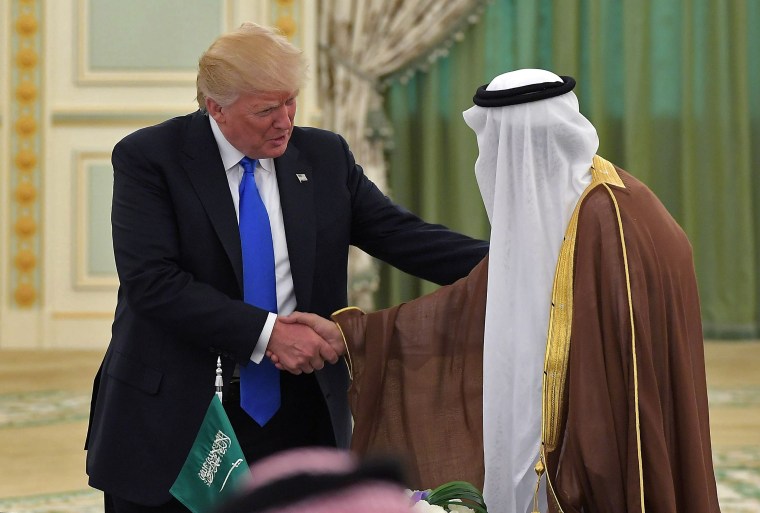On Saturday morning, Donald Trump announced on Twitter that he'd spoken to Saudi Arabia's King Salman, who agreed to increase oil production because gas prices are "to [sic] high."
The good news is, unlike many of the other phone conversations the president claims to have participated in, this call actually occurred. The bad news is, officials in Saudi Arabia quickly made clear that the Saudi leader didn't exactly say what Trump claimed he said.
Saudi officials told reporters that the kingdom made no specific promises to the American president, and as a practical matter, the Saudis probably couldn't boost production as much as Trump claimed anyway. Complicating matters, it's an open question as to whether -- and just how much -- these efforts would lower prices at the pump.
Yesterday, the White House backed away from the president's published claim.
The leader of Saudi Arabia promised President Donald Trump that he can raise oil production if needed and the country has 2 million barrels per day of spare capacity, the White House said on Saturday, rowing back on an earlier Trump tweet that appeared to suggest the Saudis had agreed to boost output by that amount.Trump said Saturday that he had received assurances from King Salman bin Adulaziz Al Saud that the kingdom will increase oil production, "maybe up to 2,000,000 barrels" in response to rising prices. Saudi Arabia acknowledged the call took place, but mentioned no production targets.
In other words, according to the White House's version, there was some confusion on Trump's part between the Saudis' spare capacity and the Saudis' production capacity.
That said, there's a reason the American president is probably feeling a little antsy about the whole subject.
According to the Trump administration's own figures, average U.S. gas prices reached a four-year high in June, and as we recently discussed, that creates a possible political issue for the White House.
It's important to acknowledge a basic truth: in general, presidents have limited influence over what American consumers pay at the pump for a global commodity. When Barack Obama took office, for example, gas prices were collapsing, not because of any policies the Democratic president had implemented, but because the international economy was in freefall. Recessions depress economic activity, which lessens the demand for fuel, and pushes prices lower.
Similarly, as Obama’s economic agenda pulled the nation out of the Great Recession, gas prices climbed throughout his first term. Republicans howled, but the trend was entirely predictable, and there wasn’t much of anything the White House could do about it.
The trouble for Trump, however, is three-fold.
First, the Republican can’t snap his fingers and lower prices, but his foreign policies – most notably regarding Iran – can affect the marketplace, at least on the margins. Democrats may push their luck while playing the blame game, but it’s not ridiculous to suggest Trump’s agenda may have some impact.
Second, the White House and its GOP allies are counting on tax breaks to buoy their electoral efforts, but as gas prices climb, many middle-class consumers won’t feel any richer as a result of the Republican policy.
And third, if Trump pushes back against Democratic criticisms by saying he can’t dictate what consumers pay at the pump, his detractors can simply point to his extensive record on the subject.
For starters, the president took a victory lap over low gas prices during the Fourth of July weekend in 2017. During the Obama-era, Trump repeatedly insisted that a president had direct influence over the price of gasoline, even calling for Obama’s firing in 2012 over the tags at the pump.“Trump previously claimed he would have tremendous power over higher gas prices but he has failed to fix them,” said Adrienne Watson, a spokesperson for the Democratic National Committee.
It was bizarre, but he really did publicly suggest, more than once, that he could help influence gas prices.
That was unwise, as was publicly misstating a commitment from Saudi Arabia.
